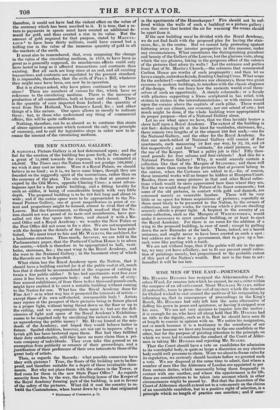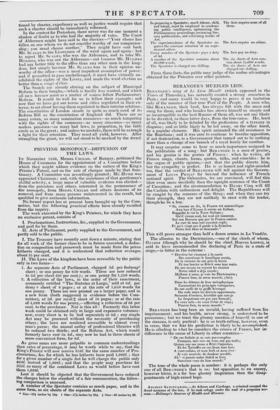WISE MEN OF THE EAST—PORTSOKEN
MR. HUGHES HUGHES has resigned the Aldermanship of Port- soken Ward, for reasons into which he cannot, he says, enter within the compass of an advertisement. Stout MICHAEL SCALES, rather ill-naturedly, tears to pieces the veil of mystery which the member for Oxford wished to cast around the motives of his resignation, by informing us, that in consequence of proceedings in the King's Bench, Mr. HUGHES had only left him the sorry alternative of dofling his gown in peace and quietness, or having it stripped over his cars. We are not very anxious to inquire into the motive : it is enough for us, who have all along held that Mr. HuatiEs had no title to the dignity, such as it is, that he should have seen fit at length to concur in opinion with us. We notice his resignation, not so much because it is a testimony to the soundness of our views, nor because we have any leaning to the one candidate or the other, but for the purpose of pointing attention to the principle on. which we were led to condemn the conduct of the Court of Alder- men in taking Mr. HUGHES and rejecting Mr. SCALES.
That the Court should have a veto on candidates for admission to its worshipful body, is quite as large a discretion as any elective body could well presume to claim. Were we about to frame rules for its regulation, we certainly should hesitate before we granted such a veto. We are disposed at the same time to admit, that where a
number of men like the Aldermen of London are appointed to per form certain duties, which necessarily bring them frequently in
contact with one another, and where the appointment is for life, there are considerations to be taken into account which' in other circumstances might be passed by. But that the discretion of the Court of Alderman should extend not to a veto merely on the claims of an unsuitable candidate, but to a positive right of selection, is a principle which no length of practice can sanction; and if sanc- tioned by charter, expediency as well as justice would require that such a charter should be immediately reformed. In the contest for Portsoken, there never was for one moment a shadow of doubt as to who had the majority of votes. The Court of Aldermen might have said to the electors—" Your choice has fallen on one whom we do not consider worthy of our companion- ship ; you must choose another." They might have sent back Mr. SCALES to the Liverymen of the ward again and again : but to reject Mr. SCALES, who was the Alderman, and to take Mr. HUGHES, who was not the Alderman—not because Mr. HUGHES had any better title to the office than any other man in the king- dom, but simply because Mr. SCALES was in their opinion un- worthy of the office—was a most impudent assumption of power; and if permitted to pass unchallenged, it must have virtually an- nihilated the rights of the Livery, and made the ward election no better than a conga d The Scotch are already stirring on the subject of Municipal Reform in their burghs,—which is hardly less wanted, and which all men foresaw must as a matter of course follow Parliamentary Reform. It would be well for us to follow their example ; and now that we have got our towns and cities regulated in their ex- terior, to set about having them regulated in their interior relations. The constitution of London stands in quite as much need of its Reform Bill as the constitution of England did. There are as many rotten, as many nomination nuisances—as much tampering with the rights of the commons—as many sinecures—as many useless pensions—as many bad laws, in proportion, in the little circle as in the great; and unless we mistake, there will be as tough a fight for their retention. They must all yield, however. After strangling the giant, we will not stand to be mocked by the dwarf.



























 Previous page
Previous page